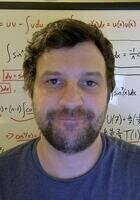First, I'd just like to express that, by far, my favorite things to do are studying and talking about math and science. I truly can't think of anything I'd rather do with my life. And I always find it to be an exciting opportunity to help others learn and gain confidence in these vast and eye-opening subjects. In doing so, I get to discuss the finer details of the things I love, which tends to reinforce and shed light on my own understanding; and, more often than not, I'm able to impart, if not a passion, at least a deeper appreciation of the material to my students.
I have a Master's degree in mathematical and computational physics from the University of Tennessee, Knoxville. I've worked on fundamental neutron physics experiments at Oak Ridge National Laboratory, Los Alamos National Laboratory, and the National Institute of Standards and Technology. I've also spent several years working at Applied Research Laboratories, at the University of Texas, Austin, where I developed and tested sonar systems for submarines and submersibles. My focus throughout my career has been on physics, digital signal processing, and software development.
I have over two years of professional teaching and tutoring experience in math and physics, ranging from one-on-one sessions to large classrooms. I've found that my genuine enthusiasm for the subject material, along with providing a calm, comfortable, and respectful atmosphere, has allowed for heightened communication and information flow between me and my students, providing them with very positive results.
I like to remain flexible in the methods and tools I use to convey information, as each student is unique in their overall response. But, despite the particular situation, I strive to uphold four perspectives:
1. A reductionist mindset of breaking a problem or theory into its individual parts.
2. Careful consideration of where to place the current block of knowledge within one's ever-growing mental infrastructure.
3. The connections between one problem space and others that we may already know.
4. A bird's eye view of where the current material falls in the wider scope of the subject or field.
By maintaining these perspectives, I find that one develops a much more intuitive understanding of the subject, leading to greater confidence and less required memorization. And I think it really guides the student in understanding how to deeply learn and study any subject or problem they may encounter, in school, their careers, and elsewhere.
Now, I'd like to include a few additional notes for potential students:
- You will always be treated with the utmost respect.
- I will do my very best to never waste your time, as I know it's very valuable.
- The last thing I want is for you to feel at all uneasy about asking questions. No matter how obvious, redundant, etc. you may think the question is, it is always worth asking, and I will always give you my best answer. I've asked thousands of such questions over the years and have learned something important every time.
- I will always mention if I am at all unsure of any detail of what I'm talking about, so as not to lead you astray.
- I will be available nearly every day outside of tutoring sessions for questions or concerns.
- For any questions during a session that I can't immediately address, and we didn't decide it better to address them in a subsequent session, I will do my very best to email an answer within 72 hours. If I find that I can't meet this timeline, I will promptly communicate to you the situation.
Below are the grades 6-12 and college subjects for which I am currently available.
College (course levels in parentheses):
- Calculus (I, II, III)
- Complex analysis (I)
- Algebra (all levels)
- General math
- Classical mechanics (I, II)
- Electromagnetism (I, II)
- Thermodynamics (I)
- Statistical mechanics (I)
- Quantum mechanics (I)
- General physics
- General science
Grades 6-12 (all course levels; standard, AP, IB, etc.):
- Calculus
- Algebra
- General math
- Physics
- General science
